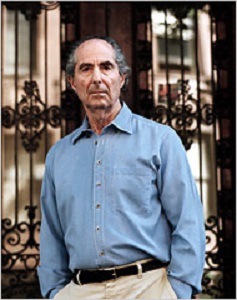De Amerikaanse schrijver Philip Roth werd geboren op 19 maart 1933 in Newark. Zie ook alle tags voor Philip Roth op dit blog.
Uit: American Pastoral
“The elevation of Swede Levov into the household Apollo of the Weequahic Jews can best be explained, I think, by the war against the Germans and the Japanese and the fears that it fostered. With the Swede indomitable on the playing field, the meaningless surface of life provided a bizarre, delusionary kind of sustenance, the happy release into a Swedian innocence, for those who lived in dread of never seeing their sons or their brothers or their husbands again.
And how did this affect him—the glorification, the sanctification, of every hook shot he sank, every pass he leaped up and caught, every line drive he rifled for a double down the leftfield line? Is this what made him that staid and stone-faced boy? Or was the mature-seeming sobriety the outward manifestation of an arduous inward struggle to keep in check the narcissism that an entire community was ladling with love? The high school cheerleaders had a cheer for the Swede. Unlike the other cheers, meant to inspire the whole team or to galvanize the spectators, this was a rhythmic, foot-stomping tribute to the Swede alone, enthusiasm for his perfection undiluted and unabashed. The cheer rocked the gym at basketball games every time he took a rebound or scored a point, swept through our side of City Stadium at football games any time he gained a yard or intercepted a pass. Even at the sparsely attended home baseball games up at Irvington Park, where there was no cheerleading squad eagerly kneeling at the sidelines, you could hear it thinly chanted by the handful of Weequahic stalwarts in the wooden stands not only when the Swede came up to bat but when he made no more than a routine putout at first base.”

Philip Roth (Newark, 19 maart 1933)
